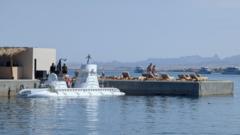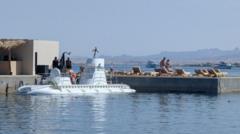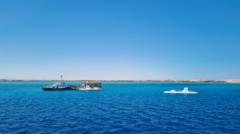Recent disclosures from a Trump administration group's chat reveal ambitious U.S. plans to tackle the Houthi militia in Yemen, prompting analysis on the feasibility of these objectives amid resistance from the Iran-backed group.
U.S. Strategy in Yemen: Challenges Ahead as Houthis Resist Airstrikes

U.S. Strategy in Yemen: Challenges Ahead as Houthis Resist Airstrikes
In light of recent airstrikes, the U.S. aims to secure Red Sea shipping lanes against Houthi aggression.
The revelation from a group chat involving Trump administration officials laid bare their military strategy regarding airstrikes in Yemen. The primary goal of these strikes, according to Michael Waltz, the national security adviser at the time, is to deter Houthi attacks on commercial vessels in the Red Sea and restore vital shipping routes to the Suez Canal.
However, experts suggest that the challenges are substantial. The Houthis, heavily supported by Iran, are not expected to be defeated through air attacks alone. Military analysts emphasize that a comprehensive ground strategy may be required, noting that in historical conflicts, air power rarely suffices for victory. The difficulties are compounded by commercial shipping companies who have found alternative routes to avoid the Red Sea, prioritizing cost-effectiveness and timelines over direct engagement in a volatile area.
According to James R. Holmes, a maritime strategy expert from the Naval War College, even during past operations where air power was dominantly employed, a subsequent land invasion was essential for long-lasting success. The current situation underscores the complexity of navigating both military and logistical challenges as the U.S. endeavors to assert control in the region against the resourceful Houthi militia.
Effective solutions will likely require a multifaceted approach, integrating both aerial tactics and ground forces to ensure a lasting impact on regional stability and free maritime passage.
However, experts suggest that the challenges are substantial. The Houthis, heavily supported by Iran, are not expected to be defeated through air attacks alone. Military analysts emphasize that a comprehensive ground strategy may be required, noting that in historical conflicts, air power rarely suffices for victory. The difficulties are compounded by commercial shipping companies who have found alternative routes to avoid the Red Sea, prioritizing cost-effectiveness and timelines over direct engagement in a volatile area.
According to James R. Holmes, a maritime strategy expert from the Naval War College, even during past operations where air power was dominantly employed, a subsequent land invasion was essential for long-lasting success. The current situation underscores the complexity of navigating both military and logistical challenges as the U.S. endeavors to assert control in the region against the resourceful Houthi militia.
Effective solutions will likely require a multifaceted approach, integrating both aerial tactics and ground forces to ensure a lasting impact on regional stability and free maritime passage.



















